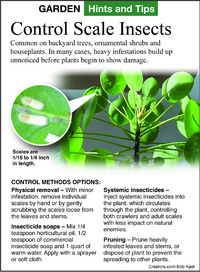Q: My wife brought in a couple of branches of colorful leaves off a red maple. They were the first to have fall color and they worked very well in a flower arrangement. Upon close inspection we realized they were covered in scale insects. That led to some investigating, and we found scale insects on a palm, a cycad and some other houseplants. What is the best way to kill them and stop the spread?
A: If a tree branch gets fall color weeks before the rest of the tree, look to see if it has some kind of insect or disease problem. In your case it was scale insects, and other branches that you didn't prune probably have some.
Scale insects are often very hard to treat. The adult female stays in one spot attached to a plant, protected underneath a waxy scale material that is impervious to water and most treatments. Insecticidal soap seems to work well against them, but you must be able to find them all. They tend to hide in tight spots in the joints where leaves attach to the stem, between leaf veins under the leaf or in cracks in the bark.
For a few weeks (usually in the spring) there will be males and females with wings that move to other plants. It is unlikely that the scale insects on the branches in the flower arrangement moved to your houseplants. The palm, cycad, other houseplants and landscape plants probably had scale insects all summer.
The juvenile-stage insect is called a crawler. It moves around the plant until it finds a suitable hiding spot to settle down into. Crawlers don't have the protection of a scale, so they are easier to attack with more normal contact insecticides or insecticidal soap.
Both stages are small and difficult to treat. It is often better to treat the whole plant. Horticultural oil sprays can be used to coat the plant and to smother the eggs, crawlers and adults. Some oils can only be applied when the plant is dormant so follow the label directions to not harm the plant. Large outdoor plants are sometimes hard to coat completely, and indoor plants will need to be moved outside for a full treatment.
Systemic insecticides are probably the most useful products to use on scale insects. They are soaked up into the plant and kill insects that are feeding on the plant. Scale insects suck plant sap, so they ingest the insecticide. All other insects not feeding on the plants are left alone, including any predators or parasites of the scale, so it is a friendlier approach to the environment.
All these treatments — insecticidal soaps, insecticides, horticultural oils and systemic insecticides — are known to kill and harm plants if the directions are not followed. Palms, cycads and other large-leafed tropical plants that are used as landscape plants in warm climates and houseplants in the north are often very sensitive to chemicals. The first thing to do is to look on any product's label to see if the plant needing treatment is listed and if the pest is listed.
The next thing to do is to test the product on a leaf or two to see what happens. I remember not testing insecticidal soap on a poinsettia and I sprayed the whole plant. Overnight, every leaf on the plant dried up like three-week-old toast — not that I know how dry three-week-old toast is. If I had just tested the spray on one leaf, I could have saved the plant.
The scale insect population tends to stop growing in winter and grows rapidly in the spring on outdoor plants. Indoors, the population may continue growing all winter, but not so rapidly that you can't do some testing and some continuing treatments. Don't try to kill them all off at once or expect miraculous cures; just start treating and keep at it and you will eventually win.
If you have the time and patience, you can start the systemic treatment and then hand-wipe each plant with horticultural oil or rubbing alcohol (after testing of course) to reduce the visible population of scale to a manageable level that will die off over time with the systemic application. You will also wipe off any dead scales, which is a good thing since dead scales don't fall off the plant on their own and can make you think that the plant is still infested with scale.
Email questions to Jeff Rugg at [email protected]. To find out more about Jeff Rugg and read features by other Creators Syndicate writers and cartoonists, visit the Creators Syndicate website at www.creators.com.






View Comments